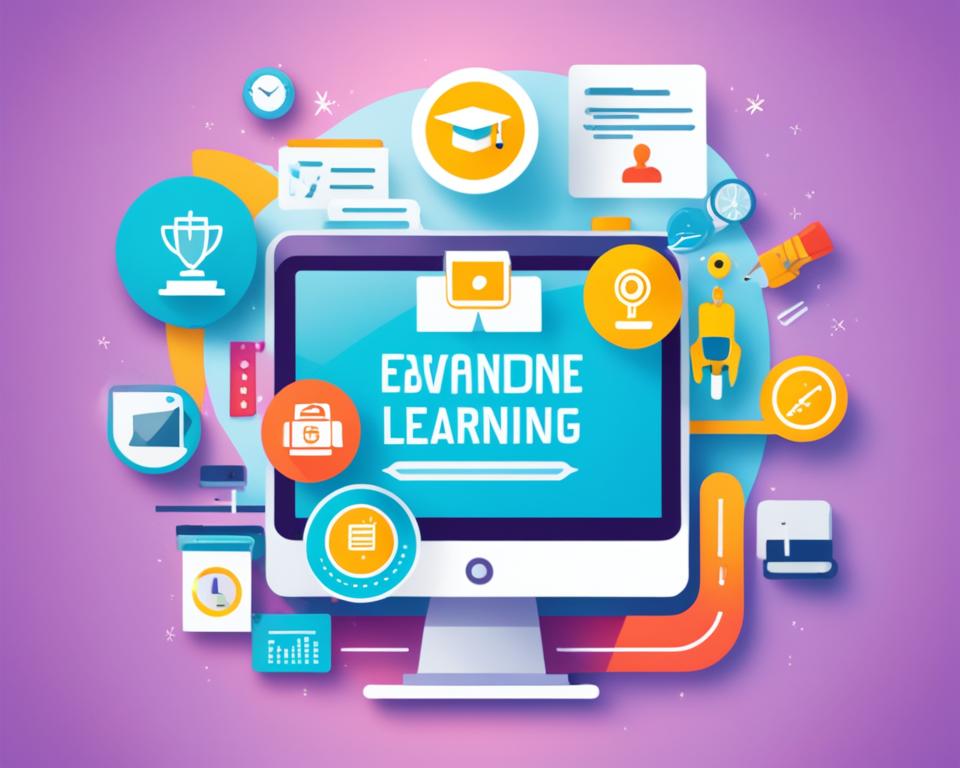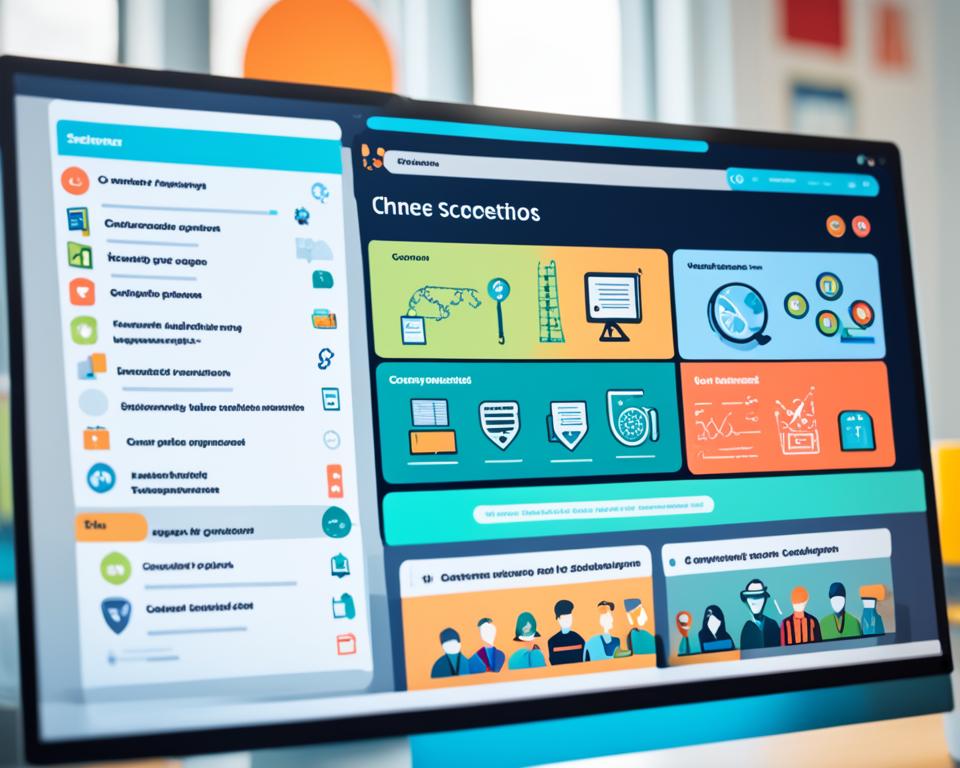Studying online offers flexibility and convenience, allowing you to pursue your education at your own pace and from the comfort of your home. However, managing your time effectively becomes crucial to ensure that you stay organized, focused, and productive. By implementing proven time management strategies, you can optimize your study experience and achieve your academic goals.
Key Takeaways:
- Set achievable goals that reflect your priorities.
- Communicate your needs with stakeholders to receive support.
- Limit technological distractions to stay focused on your studies.
- Create study habits and routines for consistent productivity.
- Practice mindfulness and self-care to manage stress effectively.
Set Achievable Goals
Setting achievable goals is a crucial aspect of effective time management for online learners. With multiple priorities, it becomes essential to establish goals that align with your personal and work schedule. By breaking down semester goals into smaller sub-goals, you can track your progress and stay motivated throughout your online education journey.
Modifying goals based on your learning requirements and adjusting them to fit your personal and work schedule is key to maintaining a healthy work-life-study balance. Flexibility is important, as it allows you to adapt your goals to unforeseen circumstances and ensures that you can effectively manage your time.
The Benefits of Setting Achievable Goals:
- Improved time management skills: By setting realistic goals, you can better prioritize and allocate your time to specific tasks and assignments. This helps you stay on track and meet deadlines.
- Increased motivation and focus: When you have well-defined goals, you have a clear sense of direction and purpose. This boosts your motivation and enables you to concentrate your efforts on the tasks that matter most.
- Measureable progress: Breaking down larger goals into sub-goals allows you to track your progress more effectively. You can celebrate small victories along the way, which can boost your confidence and encourage further success.
Remember, setting achievable goals is not about limiting your potential, but rather about ensuring that your goals are realistic and attainable within the constraints of your personal and work schedule. By doing so, you can effectively manage your time, stay motivated, and achieve academic success.
“Setting goals is the first step in turning the invisible into the visible.” – Tony Robbins
| Subject | Semester Goal |
|---|---|
| English Literature | Read and analyze 5 novels |
| Mathematics | Complete all assignments and achieve at least an 85% grade |
| History | Write a comprehensive research paper on a chosen historical event |
Communicate Needs
When studying online, it is essential to communicate your needs and share your school responsibilities with the important stakeholders in your life. By doing so, you can set boundaries and receive the necessary support to help you balance your work/family life and college classes.
First and foremost, it is crucial to have open and honest communication with your workplace and inform them about your school responsibilities. This will allow them to understand your commitments and may provide you with dedicated time or flexibility to accommodate your studies. Clear communication with your family members is equally important. By sharing your school responsibilities, you can establish boundaries and minimize interruptions during your study time.
“One secret of a successful online learner is to communicate their needs to their employers and family members, ensuring they understand the importance of their studies.”
Employers and family members can be supportive by minimizing distractions and interruptions during your designated study time. By setting boundaries, you can create an environment that allows you to focus on your coursework without unnecessary disruptions. This support plays a crucial role in enabling you to strike a balance between your work/family life and the demands of your college classes.
By communicating your needs, sharing your school responsibilities, and setting boundaries, you can establish a supportive network that helps you navigate the challenges of online learning while maintaining a harmonious work/family life.

Limit Technological Distractions
To enhance productivity while studying online, it is essential to limit technological distractions. Constant notifications and the lure of social media can significantly hamper focus and impede progress. By implementing a few simple strategies, you can minimize distractions and maximize your study time.
Silence Notifications
One of the most effective ways to limit technological distractions is by silencing notifications on your devices. By turning off audible alerts and disabling pop-up notifications, you can create a quieter digital environment that allows for uninterrupted concentration.
Time Tracking Apps
Time tracking apps can be valuable tools for increasing productivity. These apps help you monitor the time spent on different activities, giving you insights into your productivity habits. By identifying patterns and areas of improvement, you can optimize your study schedule and allocate your time more efficiently.
Block App Usage
For those struggling with self-discipline, blocking app usage can provide a helpful solution. Many apps and browser extensions allow you to temporarily block access to distracting websites and apps. By setting predetermined study periods in which you are unable to access time-consuming apps, you can maintain focus and reduce the temptation to stray from your work.
“Limiting distractions is crucial for maintaining productivity and focus during online study sessions. By silencing notifications, utilizing time tracking apps, and blocking app usage, students can create an environment conducive to deep learning.”
| Benefits of Limiting Technological Distractions | Strategies to Implement |
|---|---|
| 1. Improved focus on study-related tasks | 1. Silencing notifications |
| 2. Increased productivity | 2. Using time tracking apps |
| 3. Reduced temptation to engage in non-productive activities | 3. Blocking app usage during study periods |
| 4. Enhanced learning experience |
By limiting technological distractions, you can create a focused and productive study environment, allowing you to make the most of your online learning experience.
Make Habits Out of Your Schedule
When it comes to managing time effectively while studying online, creating habits can be a game-changer. By dedicating specific blocks of time for study, tackling repetitive tasks, tracking progress, and focusing efforts, students can optimize their time management skills and enhance their productivity. Additionally, these habits can also help students gain support from their immediate circle, fostering a conducive environment for academic success.
“Success is the sum of small efforts, repeated day in and day out.” – Robert Collier
By incorporating habits into your study routine, you can establish a structured approach to online learning. Dedicate set times each day or week for studying, just as you would for attending physical classes. This dedicated study time creates a sense of routine and discipline, ensuring that you allocate sufficient time for focused learning.
Furthermore, tackling repetitive tasks with a systematic approach helps streamline your study sessions. Identify recurring activities such as note-taking, reviewing materials, or practicing problem sets, and develop strategies to efficiently complete these tasks. Creating templates, using study guides, or employing mnemonic devices can save time and energy, allowing you to tackle these tasks more effectively.
Tracking your progress is another essential habit that contributes to effective time management. Set milestones and goals, and regularly evaluate your progress. This practice not only keeps you motivated but also helps you identify areas where you may need to adjust your study plan or seek additional support.

Benefits of Creating Study Habits
| Benefits | Description |
|---|---|
| Enhanced Time Management | Creates a structured approach to studying and ensures dedicated study time. |
| Improved Efficiency | Streamlines repetitive tasks and optimizes study sessions. |
| Progress Tracking | Enables regular evaluation of milestones and goals. |
| Increased Support | Encourages the support and understanding of your immediate circle. |
Lastly, creating study habits not only aids in time management but also allows you to gain support from your immediate circle. Communicate your study goals and commitments to your family, friends, or roommates, and explain how their understanding and support can contribute to your success. By involving them in your journey and expressing your needs, you can establish an environment that fosters productivity and minimizes distractions.
In conclusion, by making habits out of your schedule, incorporating dedicated study time, tackling repetitive tasks, tracking progress, and gaining support from your immediate circle, you can effectively manage your time while studying online. These habits not only optimize your productivity but also contribute to a positive learning environment, setting the stage for academic success.
Practice Mindfulness and Self-Care
One of the key strategies for effective time management during online studies is practicing mindfulness and self-care. Taking care of your mental and emotional well-being is crucial for managing stress and increasing study effectiveness. By incorporating self-care practices into your routine, you can unwind, recharge, and maintain a healthy balance throughout your academic journey.
Unwind and Manage Stress
Mindfulness techniques can help you relax and alleviate stress. Taking breaks and engaging in activities like meditation, deep breathing exercises, or practicing yoga can have a significant impact on your overall well-being. These practices allow you to clear your mind and refocus, enhancing your ability to manage stress and cope with challenging situations.
Additionally, balancing academic responsibilities with personal commitments is essential. Make time to spend with family and friends, pursue hobbies, or engage in activities that bring you joy. These moments of relaxation and enjoyment can help reduce stress, renew your energy, and ultimately improve your study effectiveness.
Take Breaks and Recharge
Remember, taking breaks is not a waste of time; it’s an essential part of maintaining productivity. Incorporating regular breaks into your study schedule allows your brain to rest and recharge, preventing burnout and improving your ability to retain information. Whether it’s going for a walk, listening to music, or simply taking a few minutes to relax, these moments of respite contribute to your overall well-being and help you stay focused and motivated.
Practice Self-Care
Self-care extends beyond breaks and leisure activities. It also involves attending to your physical health and creating a supportive environment. Make sure you get enough sleep, eat nutritious meals, and exercise regularly. Prioritizing your well-being allows you to show up fully for your studies, ensuring that you have the energy and focus needed to succeed.
| Benefits of Mindfulness and Self-Care for Online Students |
|---|
| Mindfulness techniques reduce stress levels and promote mental well-being. |
| Engaging in self-care activities helps maintain a healthy work-life balance. |
| Taking regular breaks improves focus, productivity, and information retention. |
| Practicing self-care enhances overall physical and mental health. |
By prioritizing mindfulness and self-care, you are equipping yourself with the tools necessary to manage stress, increase study effectiveness, and maintain a healthy and balanced approach to your online studies.
Plan ahead
Planning ahead is a crucial strategy for online students to effectively manage their time. By taking proactive steps to organize their schedule and tasks, students can stay focused and achieve their goals. Here are some key tips for effective planning:
- Divide Tasks: Break down larger assignments or projects into smaller, more manageable tasks. This approach helps prevent overwhelming workload and allows for better focus and productivity.
- Use a Calendar: Utilize a calendar or scheduling tool to map out deadlines, due dates, and important milestones. By visualizing the timeline, students can prioritize their assignments and allocate sufficient time for each task.
- Prioritize Assignments: Determine the relative importance of each assignment or task. By prioritizing tasks based on deadlines and significance, students can allocate more focused time and energy to high-priority items.
- Establish a Routine: Consistency is key to effective time management. Establishing a daily or weekly routine helps create a structured approach to studying, allowing students to develop productive habits and stay on track.
Table 7.1: Time Management Tips
| Tip | Description |
|---|---|
| Plan Ahead | Divide tasks, use a calendar, prioritize assignments, and establish a routine. |
| Frequent Engagement | Regularly engage with study materials, participate in online discussions, and communicate with peers and instructors. |
| Manage Time Effectively | Allocate dedicated time slots for studying, avoid procrastination, and minimize distractions. |
By implementing these planning strategies, online students can better manage their time, improve productivity, and achieve academic success. Remember, effective time management is essential for maintaining a healthy work-life balance and maximizing the benefits of online education.

Don’t multitask
When it comes to managing your time effectively while studying online, one important strategy is to avoid multitasking. Focusing on one task at a time not only helps increase your productivity but also allows you to give each task the attention it deserves.
Instead of trying to juggle multiple tasks simultaneously, prioritize your tasks based on their importance and urgency. This way, you can tackle each task with full focus and complete it efficiently before moving on to the next one.
To stay organized and ensure you don’t miss any important tasks, consider using project management tools. These tools can help you keep track of deadlines, create task lists, and prioritize your assignments effectively. They provide a visual representation of your tasks, making it easier to manage your time efficiently.
In addition to using project management tools, creating to-do lists can also be beneficial. By jotting down all the tasks you need to accomplish in a list format, you can have a clear overview of what needs to be done and prioritize accordingly. Crossing off tasks as you complete them provides a sense of accomplishment and motivates you to continue being productive.
“Focusing on one task at a time not only helps increase your productivity but also allows you to give each task the attention it deserves.”
Remember, multitasking may give the illusion of being productive, but it often leads to decreased efficiency and a higher likelihood of making mistakes. By avoiding multitasking, you can concentrate your efforts on one task and complete it to the best of your abilities.
Prioritizing Tasks
When you have a lot on your plate, it’s important to prioritize your tasks effectively. Start by identifying the most critical tasks that require immediate attention. These can be tasks with impending deadlines or tasks that are essential for your overall progress.
Once you have identified the priority tasks, focus your energy on completing them before moving on to less urgent tasks. By tackling the most important tasks first, you ensure that you allocate your time and resources to what matters the most.
When assigning priority, consider the impact each task has on your overall goals and objectives. Ask yourself questions like:
- Which tasks contribute the most to my educational success?
- Which tasks align with my long-term goals?
- Which tasks require immediate action to avoid negative consequences?
By answering these questions and prioritizing accordingly, you can make sure you are focusing on tasks that will have the greatest impact on your academic performance.
Conclusion
Effective time management is crucial for online students to achieve academic success and balance their responsibilities. Online education offers flexibility, but without proper time management, it can be easy to become overwhelmed and fall behind. By implementing a variety of strategies, students can enhance their productivity and effectively manage their time.
Setting achievable goals is the first step towards effective time management. Breaking down larger goals into smaller sub-goals and modifying them based on personal and work schedules allows students to stay on track and make progress consistently.
Communication is key when it comes to balancing responsibilities. By effectively communicating their needs with employers, family members, or other stakeholders, students can establish boundaries, gain support, and minimize interruptions to their study time.
In order to minimize distractions, it’s important to limit technological distractions. Students can silence notifications, use time tracking apps, and even block app usage during dedicated study time. This helps them stay focused and increase their productivity.
Creating study habits and practicing mindfulness are also important aspects of effective time management. By establishing a study schedule, tackling repetitive tasks, and tracking progress, students can develop productive habits that enhance their study effectiveness. Additionally, practicing mindfulness and self-care through activities like meditation or spending time with loved ones can help manage stress and improve overall productivity.
In conclusion, by implementing these strategies – setting achievable goals, communicating needs, limiting distractions, creating study habits, and practicing mindfulness – online students can strike a balance between their academic responsibilities and other obligations. Through effective time management, students can enhance their productivity, achieve academic success, and make the most out of their online education.
FAQ
What strategies can I use to manage my time effectively while studying online?
To manage your time effectively while studying online, you can implement various strategies such as setting achievable goals, communicating your needs, limiting technological distractions, creating study habits, practicing mindfulness and self-care, planning ahead, and avoiding multitasking.
How can I set achievable goals as an online learner?
As an online learner, you can set achievable goals by breaking your semester and term goals into smaller sub-goals, modifying goals based on your learning requirements and personal/work schedule, and adjusting your goals accordingly.
How can I communicate my needs as an online learner?
To communicate your needs as an online learner, you can share your school responsibilities with stakeholders such as employers and family members. This helps in setting boundaries and receiving support from your workplace and family, enabling a balance between your work/family life and college classes.
How can I limit technological distractions while studying online?
To limit technological distractions, you can silence notifications, take breaks to check notifications, use time tracking apps to manage your online time better, and block app usage during your study sessions. These strategies can help minimize distractions and increase your focus on study-related tasks.
How can I create study habits while studying online?
Creating study habits involves dedicating specific blocks of time for studying, tackling repetitive tasks, tracking your progress, and focusing your efforts. By establishing these habits, you can effectively manage your time and gain support from your immediate circle, promoting productivity.
How can practicing mindfulness and self-care help in managing my time effectively while studying online?
Practicing mindfulness and self-care can contribute to managing your time effectively while studying online by helping you manage stress and increase study effectiveness. Taking breaks, engaging in activities like meditation, spending time with family, or pursuing personal hobbies can contribute to stress management and improve your overall productivity.
How can I plan ahead to manage my time effectively while studying online?
Planning ahead is crucial for managing your time effectively while studying online. You can divide tasks, use a calendar to prioritize assignments, and establish a routine. These strategies help in staying organized, managing time efficiently, and ensuring timely completion of your online coursework.
Why should I avoid multitasking while studying online?
Avoiding multitasking and focusing on one task at a time can increase your productivity. Prioritizing tasks, using project management tools, and creating to-do lists are effective ways to organize your tasks and remain focused on your studies.
How important is effective time management for online education?
Effective time management is crucial for online students to achieve academic success and balance their responsibilities. By implementing strategies such as setting achievable goals, communicating needs, limiting distractions, practicing mindfulness, creating study habits, planning ahead, and avoiding multitasking, students can enhance their productivity and achieve their educational goals.





